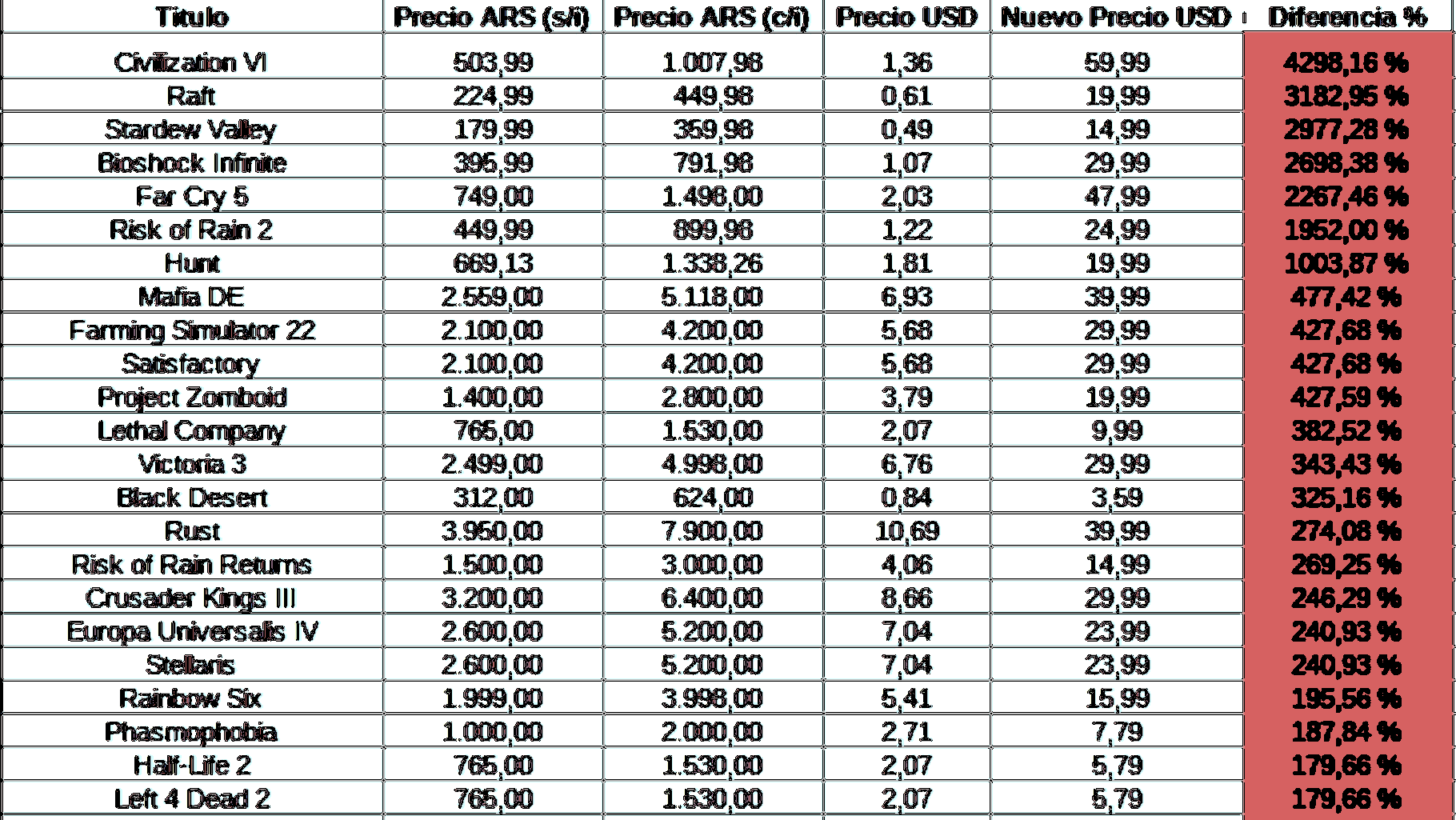Steam's regional price hikes of up to 4298% could spur exodus from Argentina and Turkey gamers
Most price increases are 20–300 percent, but that's still a death knell for low-income markets.

On November 20, Valve changed its pricing policy in Argentina and Turkey to pivot from their pesos and lira currencies to the U.S. dollar. This move resulted in severe price hikes for the majority of games, with extreme cases resulting in multi-thousand percentage price increases. "The end of Steam" has already been declared by many Argentinian and Turkish Steam users, resulting in both humorous edits and cold, hard data outlining just how bad this issue will be.
Now, to be fair, there is evidence to suggest that these pricing conditions won't remain quite so severe. While Valve sent out warnings to developers to set region-appropriate pricing changes prior to this update, many of them didn't, and the result was many games defaulting to full USD pricing, making them unaffordable to users in the regions. The base game version of Civilization VI is the most extreme example, with a price hike of 4298% to $60 USD, where it used to be only $1.36 USD (equivalent) prior to the policy change.
If you're doing the math or you've been keeping up with Valve news, you may already have an idea of why this is happening. Basically, some Steam users will spoof their region to be in one of these "cheap" locations in order to get access to lower priced games. There's your profit motive right there. Additionally, the lira and peso are so inflated (and fluctuate so frequently), that Valve stated it was unfair to developers to have to constantly adjust prices with those market conditions.
Unfortunately, those market conditions are a hard reality for Argentinians and Turkish folk. Turning PC games into an unattainable expense for these users is almost certainly not going to increase sales. In fact, many are already openly stating that they'll be returning to piracy, which reminds me of Gabe Newell's own statements on piracy.
According to Gabe Newell, founder of Valve Software and owner of Steam, "piracy is a service problem". As much truth as I think there is in that statement, particularly in wealthier countries like the United States I call home, it seems clear that Argentinian and Turkish PC gamers are actively being priced out of legitimate PC gaming if things don't change, and soon. Otherwise, Steam might really be dead in the water— at least for these regions.
Get Tom's Hardware's best news and in-depth reviews, straight to your inbox.

Christopher Harper has been a successful freelance tech writer specializing in PC hardware and gaming since 2015, and ghostwrote for various B2B clients in High School before that. Outside of work, Christopher is best known to friends and rivals as an active competitive player in various eSports (particularly fighting games and arena shooters) and a purveyor of music ranging from Jimi Hendrix to Killer Mike to the Sonic Adventure 2 soundtrack.
-
coolitic I know from my friends who've lived in Turkey that, even after the exchange rate, the prices of games were ridiculously cheap in places like Turkey. So no, this isn't anything but a long time coming.Reply -
TJ Hooker Any idea what the difference is shown between the first two column in the table? The headers are the same except for one ends with "(s/i)", and the other with "(c/i)", and the 2nd column values all seem to be double the values in the first column.Reply -
flamewager Reply
s/i means "without taxes" and c/i means "with taxes".TJ Hooker said:Any idea what the difference is shown between the first two column in the table? The headers are the same except for one ends with "(s/i)", and the other with "(c/i)", and the 2nd column values all seem to be double the values in the first column.
The first column is the list price that is shown in the store and what the developer gets when you make a purchase (converted to USD in the third column using today's exchange rate). The second column is how much you end up paying: the list price plus various taxes (which to date total up 100% of the list price) -
TCA_ChinChin Reply
Doesn't that have to do with how the average salary there is a lot lower, so weaker markets get markdowns? I imagine that places with a lot lower wages have adjusted steam prices, otherwise people are just gonna pirate the games instead.coolitic said:I know from my friends who've lived in Turkey that, even after the exchange rate, the prices of games were ridiculously cheap in places like Turkey. So no, this isn't anything but a long time coming. -
_Shatta_AD_ This isn’t just an issue with games nor exclusive to those two countries. It’s with most electronics and services. Feel in my wallet in Canada too, a not so low income country. GPUs that costs CND$2000 when it costs $1199 in the US, same goes for just about every PC components and accessories, TVs, consoles, games, softwares, audio equipment, even services like GeForce Now are hiking prices in Canada. It’s quite unfair when companies price everything based on USD.Reply